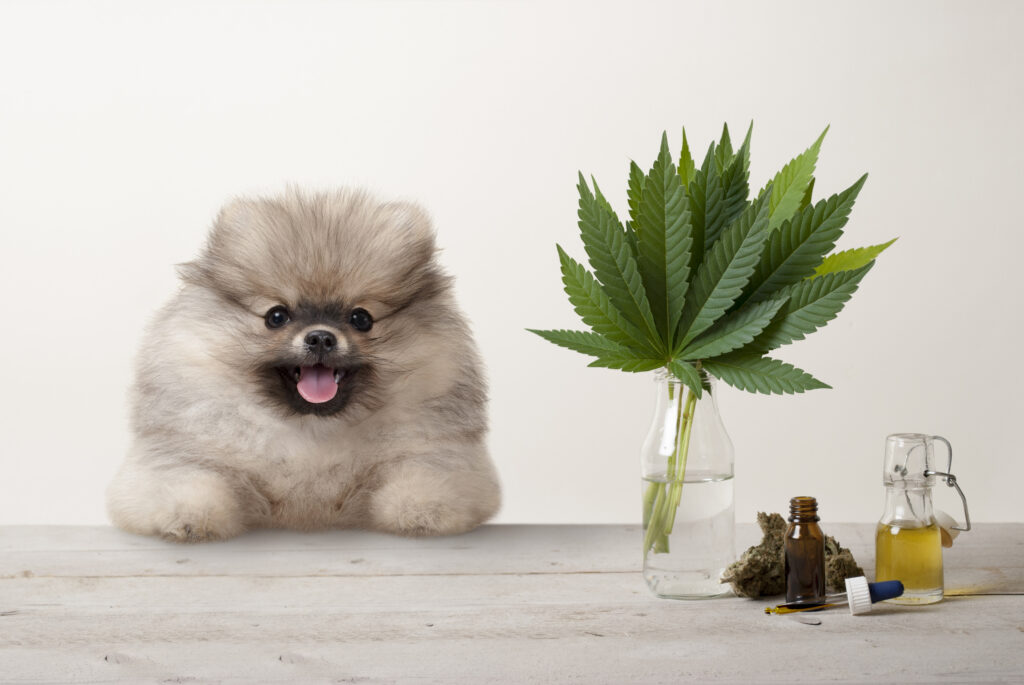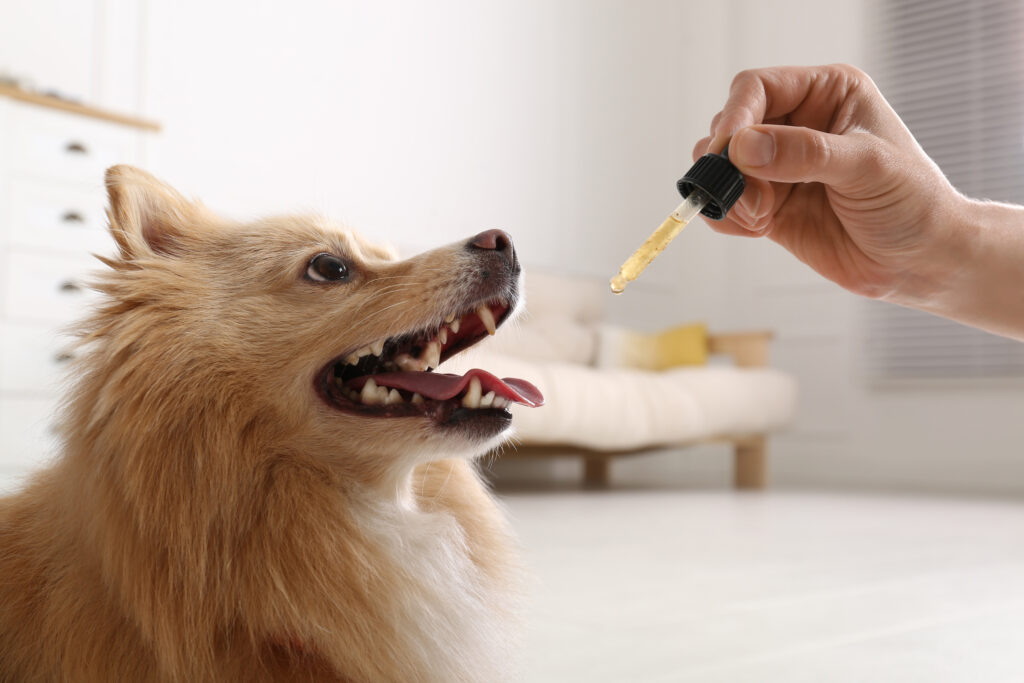
Although it may manifest itself in different ways, our furry-four-legged friends, too, can experience anxiety. Anxiety in cats and dogs can range from generalized anxiety and separation anxiety to social anxiety, phobias, obsessive-compulsive disorder, and post-traumatic stress disorder.
Not only is anxiety uncomfortable for pets, but it can also lead to some troublesome behavior around the house. Excessive barking, aggression, and “accidents” (despite being house-trained) are common behaviors associated with pet anxiety. Your cat or dog may also take their restless energy out on your furniture, clawing, chewing, or urinating on valuable household objects.
While there are certain techniques you can try to help calm and comfort your pet, it isn’t always enough. With the rise of various pet CBD products on the market, is it possible that a little CBD is all your puppy or kitty needs to help feel at ease?
What Does Anxiety Look Like in Dogs?
As mentioned above, dogs can experience several different types of pet anxiety:
- Separation Anxiety: Separation anxiety is one of the most common forms of distress among dogs. This occurs when a dog becomes incredibly unnerved whenever its owner tries to leave the house without them.
- Generalized Anxiety: Generalized anxiety in dogs can manifest as excessive nervousness, trembling, barking, tension, and heart palpitations. Unlike separation anxiety and phobias, there isn’t an apparent stressor that seems to be triggering the dog’s anxiety; the pup is simply just anxious.
- Phobias: Various types of phobias are common among dogs. Some canines are terrified of loud noises, such as thunder, fireworks, or even your typical household vacuum. Your dog may also be scared of car rides, stairs, people, other dogs, baths, or vet visits.
- Obsessive-Compulsive Disorder: OCD occurs in dogs, typically in the form of repetitive behaviors in response to stress and anxiety. These behaviors aren’t entirely well defined, though they may include spinning in circles, self-mutilation, excessive humping, and frequent tail chasing (especially if your dog’s tail is missing).
- Post-Traumatic Stress Disorder: Dogs may develop PTSD if they were abused or raised in toxic environments. They can also develop PTSD if their previous owner passed away, if they were abandoned, or if they were in a serious accident.
Dogs with anxiety present excessive signs of fearfulness, nervousness, and sometimes aggressiveness. Usually, this leads to behavioral problems such as excessive barking, howling, destruction, having “accidents” inside the house, and following you around in fear.
What Does Anxiety Look Like in Cats?

Like dogs, cats can also suffer from generalized, separation, and social anxiety disorders. Cats can develop phobias, OCD, or PTSD, too.
The signs of anxiety in cats are very similar to those of dogs; trembling, nervousness, repetitive and/or destructive behaviors, self-mutilation, and aggression. Cats may also experience digestive distress due to anxiety or become less active and playful. Overgrooming is another sign of anxiety in cats.
Alleviating Your Pet’s Anxiety with CBD Products
Cannabidiol (CBD) is a non-psychoactive cannabinoid present in hemp and cannabis plants. Repeatedly, studies have demonstrated that CBD displays anti-inflammatory, antioxidant, and anxiolytic properties in both humans and animals.
There have also been a few studies that assess the safety and efficacy of CBD extracts for dogs. Studies on CBD products for cats, however, are very limited.
Specifically, studies on CBD products for dogs have assessed the cannabinoid’s efficacy in alleviating osteoarthritis and reducing seizure frequency. Both of these studies found CBD effective and safe for dogs.
Other studies have also assessed the safety and bioavailability of CBD pet products among healthy pets. One study concluded that CBD appeared to be safe to use among healthy adult dogs. But it also found that cats had a lower oral absorption of CBD and a shorter duration of CBD in their system. The authors say this data suggests the dosing for cats may be different than the dosing for dogs.
That study also found that cats displayed excessive licking and head shaking after taking CBD, suggesting that more research is needed to better understand the safety, bioavailability, and efficacy of CBD products for our feline friends.
CBD Products for Dogs

Dog CBD products are available in various forms, including treats, chews, and tinctures. The amount of CBD may also vary from product to product, depending on its intended use.
For example, dog CBD treats for “hip and joint pain” may have a different dosage than treats for “anxiety” or “insomnia.” In either case, make sure you read the label carefully and follow the dosing instructions on the package.
Whether you should opt for a tincture, a treat, or a chew for your pup all comes down to preference. Tinctures offer a precise way to dose the CBD for your dog using a dropper. However, you might find it difficult to open their mouth and place the drops under your tongue.
Chews offer a soft texture for dogs who have trouble chewing harder treats — this is especially convenient for senior dogs who may not be able to handle a tougher textured treat.
CBD capsules are another viable option for dogs. If your dog has trouble swallowing pills, you can place them in a dog “pill pocket” treat or disguise them with dog-friendly peanut butter.
CBD Products for Cats
Like dog products, CBD for cats is available in the form of treats, chews, tinctures, or capsules. Again, which to choose all comes down to preference.
Regardless of your choice, make sure the product is specifically formulated for cats. The nutritional needs and preferences of cats vary widely from those of dogs. And as we’ve seen with the study mentioned above, cats appear to have different dosing needs than dogs regarding CBD.
As always, please be sure to closely follow the guidelines and recommendations outlined on the package of the CBD cat products.
Key Takeaways: CBD May Calm Your Furry-Four-Legged Friends

Anxiety can affect humans, cats, and dogs alike. While it may be easy to see troublesome behavior as a form of your pet acting out, it may actually be a cry for help. They can’t verbally tell us they’re feeling anxious, so it often manifests itself in different types of behavioral problems.
Rather than getting frustrated with your puppy or kitten, it’s important to recognize their emotions and help them feel comfortable. In some cases, training and affection aren’t enough to ease their nerves.
CBD is a non-psychoactive cannabinoid with a myriad of potential therapeutic effects. Many pet owners use CBD to help alleviate their pet’s chronic pain or seizures. But CBD has anxiety-reducing properties that may help your pet, as well.
Just be sure the CBD products you purchase are formulated for pets and are from a reputable company. Carefully follow the guidelines and dosing instructions on the package of the pet treats, chews, tinctures, or capsules you purchase.
References
- Ibanez, M., & Anzola, B. (2011). Anxiety Disorders in Dogs. Anxiety Disorders. https://doi.org/10.5772/23135
- Fantegrossi, D. (2018, September 24). 10 Of The Most Common Fears And Phobias In Dogs. iHeartDogs.Com. https://iheartdogs.com/common-fears-phobias-dogs/
- PetMD Editorial. (2016, April 1). Anxiety and Compulsive Disorders in Dogs. PetMD. https://www.petmd.com/dog/conditions/behavioral/c_dg_compulsive_disorders
- Verrico, C. D., Wesson, S., Konduri, V., Hofferek, C. J., Vazquez-Perez, J., Blair, E., Dunner, K., Salimpour, P., Decker, W. K., & Halpert, M. M. (2020). A randomized, double-blind, placebo-controlled study of daily cannabidiol for the treatment of canine osteoarthritis pain. Pain, 161(9), 2191–2202. https://doi.org/10.1097/j.pain.0000000000001896
- McGrath, S., Bartner, L. R., Rao, S., Packer, R. A., & Gustafson, D. L. (2019). Randomized blinded controlled clinical trial to assess the effect of oral cannabidiol administration in addition to conventional antiepileptic treatment on seizure frequency in dogs with intractable idiopathic epilepsy. Journal of the American Veterinary Medical Association, 254(11), 1301–1308. https://doi.org/10.2460/javma.254.11.1301
- Deabold, K. A., Schwark, W. S., Wolf, L., & Wakshlag, J. J. (2019). Single-Dose Pharmacokinetics and Preliminary Safety Assessment with Use of CBD-Rich Hemp Nutraceutical in Healthy Dogs and Cats. Animals, 9(10), 832. https://doi.org/10.3390/ani9100832